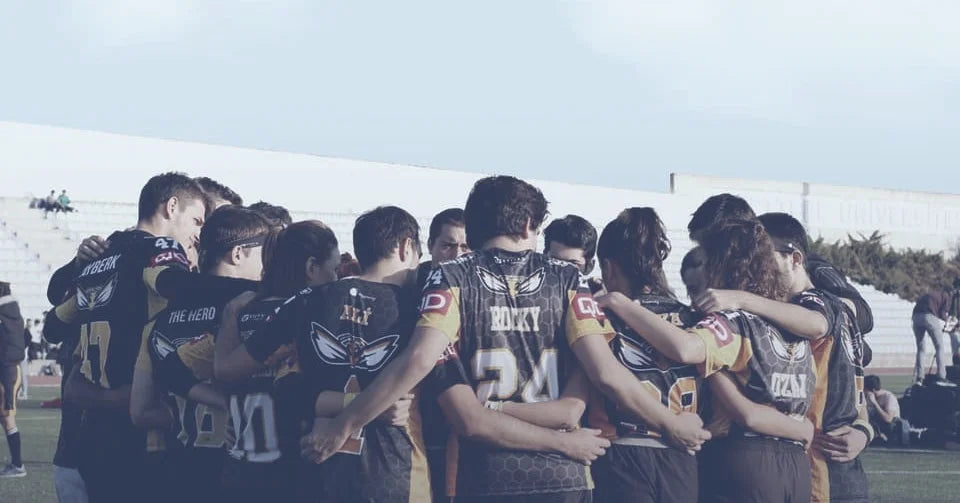SEB WATERS
23 years old, working in investment analytics in London. I’ve been playing quidditch for just under 6 years, the first four with Warwick QC at university where we won two British Quidditch Cup silver medals and completed the set of medals at regionals (that’s better than three golds right?!). I then went on to help start up London QC in 2018 where we won the British Quidditch Cup in our first season. I was captain of Warwick in my second year and have been coach every team I’ve been a part of since!
I’ve been lucky enough to spent most of my summers at international tournaments with Team UK and have won a World Cup bronze medal in Frankfurt in 2016 as well as gold and bronze at the European Games in 2017 and 2019.
I’ve also played for the last three years in the QPL, winning back to back gold medals with the West Midlands Revolution and London Monarchs in 2017 and 2018, and got silver in 2019 with the Monarchs.
-How did you start playing quidditch?
In the summer before starting university, I was at the pub with a group of friends. One of them had recently read that quidditch was actually a real sport and we all agreed (under influence of alcohol) to go to the try-outs at our universities. So, in my second week at university, I went along to a training and loved it. It was so fun to learn about a completely new sport with so much scope for new ideas
-What does your social environment think about quidditch?
My friends from home all thought it was great (although of course a little niche), however I later learnt that none of them had ended up giving it a try as promised themselves! At university it was a similar story, and I even managed to drag my friend Ben [Malpass] along in my second year (I like to think he enjoyed it!). More generally, the rule I tend to go by is that if someone doesn’t accept you because of something you enjoy then they probably aren’t worth caring about in the first place.
-How did work-life affect quidditch?
Work life makes you value time off much more highly than as a student. It becomes the priority, where previously quidditch got lots of attention. So naturally, you train a bit less and focus more on tactical ideas and maintaining your skills. Keeping in shape is easy enough if you can keep getting to the gym as a part of your routine, but sadly it’s close to impossible to spent as much time and effort playing quidditch.
-England is where football is born, and without doubt it’s one of the most popular sports, can you compare the football and quidditch about their social structures?
As sports, they are worlds apart and require vastly different skill sets. Though this didn’t stop me trying to play quidditch like football by playing a possession game for 3 years!
For me the social sides are also far apart. Where socialising with my football team was primarily heavy drinking and often involved mocking one another, quidditch was… well it was the same. But the people I played with were some of the kindest and most accepting people I’ve met and that’s what made it so great for me.
-You have friends from Turkey also, you have visited Ankara. What do you think about quidditch in Turkey and the players?
Until last summer, my only experiences of Turkish Quidditch were in a playing sense at EQC, EG and World Cup. I enjoyed playing against these teams because of their aggression, determination and most importantly organisation. I’d played aggressive teams in the UK, but nothing compared to the orchestrated aggression that was displayed by the Unicorns when they destroyed Warwick at my second EQC. Luckily I got some revenge the European Games that summer, but it very much opened my eyes to a different way to play the game.
My favourite thing about Turkish Quidditch having now spent some time at TQK is the “generational” team structure. It was the first time I’d heard a player talk about it being their time to step aside so that the younger players could have more minutes and the spotlight. Most of elite European Quidditch is built around a group of elite players, who have been around for years. Meanwhile, although they have always had star players, Unicorns (and to some extent Hippogriffs) have been at the top level each year but relying on a different group to get there.
-Are there any social differences among Turkish and English teams as far as you observed?
Socially, things were far more similar that I expected. Turkish Quidditch benefits in a way from having fewer teams, as this means that there is a slightly more close-knit feel to the tournaments. Though this is also helped by the fact that high level Turkish players are often volunteering and refereeing when not playing, while their English counterparts tend to treat game breaks as just that and find somewhere to relax.
-What’s the best part of quidditch for you?
Winning. And also, the people I play with. But mostly winning.
Honestly, I could write an essay about the kind and accepting community that you find in quidditch. But the thing that keeps me hooked is the fact that the top is so close. Competing at an international level will (sadly) never happen for me in football, but the rush of playing teams from around the world and winning is a feeling that you just can’t get elsewhere.
-What do the competitive and social sides of the tournaments like EQC and WC mean to you?
Primarily, the socials are a great way to celebrate (or forget about) the result of a tournament! But getting to know people from other international teams is one of the most special parts of the sport for me. I have friends from across Europe that I would just not have had otherwise and the bonds and relationships you can maintain through these events is really unique to quidditch.






